It’s tax season, agents! Filing your taxes is a little different than for a standard employee. Most agents, except on the rare occasion, are self-employed. You may see it listed as “statutory nonemployee” or “independent contractor” in your paperwork. As the sole proprietor of your business, it’s up to you to pay your taxes since your broker does not withhold from your commissions like an employer would. Becoming acquainted with your taxes is essential for managing your finances and being a successful business owner.
Whether or not you hire a professional to help you handle your tax filing (and you should), it’s still important to understand and prepare your taxes. So we’ve compiled five tips for filing taxes and staying on top of your finances throughout the new year.
1. Open A Bank Account For Your Business
As a real estate agent, you naturally have many costs and expenses in your business, from marketing to gas in your tank. Those expenses must be organized so you can add them up for your tax deductions. Create a separate bank account just for your business, and use it to deposit your income and also to pay your business expenses. That means if you have a credit card for business expenses, pay the credit card from your business account as well.
This simple practice of having and maintaining a separate bank account will make taxes a breeze for you or your CPA — should you choose to hire a professional.
2. Make Estimated Tax Payments
Because your broker doesn’t withhold anything from your earnings, you have to pay your income taxes and your self-employment taxes (social security and Medicare taxes) periodically throughout the year. You can, for example, pay taxes after each closing, but if not, at the very least you are required to pay on a quarterly basis: April 15, June 15, September 15, and January 15. See this chart for more details on the quarterly schedule.
Keep in mind that these periodic payments are estimates based on your taxes paid in the prior year. The final amount of taxes you pay is determined by taking your taxable income, minus your expenses multiplied by your tax rate. You will know that rate when your tax return is completed. You (or your CPA) will use the 1040-ES form to calculate these estimated tax payments. Generally, agents are advised to set aside 30% of their income for income taxes and self-employment taxes. It is recommended that you either make these estimated tax payments or set aside 30% of your income as it comes in throughout the year.
As long as you make all of your estimated tax payments in full and on time you will not need to worry about a tax shortfall when you file your tax return. Any additional taxes owed will not be considered as paid late as long as you file your return and pay the remaining amount due on time (April 15th if filing a 1040 Form or March 15th if filing a 1120 Form).
3. File Annually
Because your periodic payments were estimates, you’ll still have to do an annual filing to true-up your bill for the year. You may have ended up overpaying or underpaying with your estimated payments.
The Forms You’ll Need As A Real Estate Agent
While employees receive a W-2 report from their employer, self-employed agents receive a 1099-MISC from their broker. Like the W-2, it reports your income received in the calendar year.
The next form you will use is the standard annual tax return form — the 1040 — although you will fill out two additional schedules because you are self-employed: schedule SE, which is used to calculate self-employment taxes and schedule C, which is used to calculate your net profit.
Tax Deductions vs. Tax Credits
Both tax deductions and tax credits save you money on your income taxes, but they apply differently in your tax return and have different qualifications. Most people have deductions (the costs of doing business), while it is less common to have tax credits.
4. Deduct Your Real Estate Coaching and Education Expense
Good news, Workman Success Systems’ Private Coaching and Group Coaching options are tax deductible! If you are investing in your professional education, such as WSS Training Center, that’s also a write-off under the Education and Training deduction. Don’t forget that this investment of your time and money has a payoff during tax season!
5. Find a CPA You Trust
Often your business associates will be great references for a trustworthy CPA. Your CPA will tell you what you need to file your tax return and will answer questions. Find someone no later than February so you can get your tax return filed on time!


